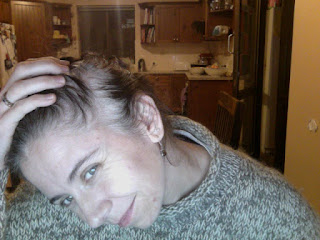But wait…there's more!
If you feel that you are up to speed with our tale, then you would be wrong.
Last week our appointment at the children's hospital was great because it was the first time in six months that we had been given concrete direction on how to move forward.
One of the steps in the plan was that we had to find a psychologist ourselves. So I dutifully went along to our GP for a recommendation. She called the first practice she could think of that would deal with adolescents.
Turns out that Headspace actually run a fatigue clinic for adolescents in Camperdown that is affiliated with the University of New South Wales. When I rang them to ask for an appointment and told them our story, they expressed surprise that Westmead even helps with fatigue because as far as they know, they, and UNSW, are the only organisations in Sydney that run official fatigue clinics.
Amazingly there was an appointment slot free the following day which we took, even though we felt that we were doubling up on input. When Rowan took J along to the appointment they spent two hours with her - one hour with a psychologist and another hour with an exercise physiologist. J was so chirpy when I got home from work and told me that she thought it was fantastic. They spent more time actually talking to her about her experience.
The programme they have given her is more comprehensive and detailed than the one we received last week. For three weeks she has to record her activity for every hour of the day, describe what she has done in that hour and then rate each part of the day for how tired she is feeling. It looks like Westmead has broadly based their programme on this one from UNSW but with a major difference.
By tracking her ups and downs during the day, it is creating a much more detailed understanding of what triggers a crash, how far she can go before crashing, how much recovery time she needs. After three weeks they will analyse her results and then create a timetable for her based on her patterns. This means it's custom designed and responsive to her particular version of the fatigue. Over the next ten weeks she'll have regular appointments and they will keep adjusting it.
I feel that I can now truly say that FINALLY we are getting the help that we have needed for the past three months. I pretty much wanted to start rocking in a foetal position when I heard about this clinic because - arrgh - what was all the other stuff we'd been through?
Backtracking for a bit it was after three months seeing our (wonderfully patient) GP we realised she wasn't getting better so we saw a paediatrician in Randwick. Why did he not refer us to UNSW straight away? Why did he stuff around when I specifically asked for a management plan straight up? Why did he then decide (six weeks later and with hardly speaking to her at all) that she should see a psychologist because she was depressed (which isn't her primary issue)? Why did Westmead not tell us about a fatigue centre closer to home? We've had a number of medical 'breakups' along the way.
So many questions. It's frustrating because dragging a sick child around the countryside is distressing. Making endless appointments and trying to fit them into our life is stressful. It's so hard to feel that we are three months behind where we should be simply because no-one seems to communicate with one another. Navigating the health system is hard work. The services are there but finding them is a drilling down process-layer upon layer. I keep thinking 'English is my first language. I am a confident, educated, articulate, fairly pushy person. How on earth can most people access the help they need?'.
There have been lots of hiccups but we feel pleased with where we've landed. I do hope that our story is helpful if other people down the track go through this experience.
Now to the job of actually helping her regain some kind of normal functionality. After the saga of the past six months, this feels like a draining prospect. But you press on.




Comments
I've had that same thought in a number of situations. So pleased you're heading in a good direction :)
It can take a while to find the professionals you feel are the right ones to help. That quote that Petrina put up is something I've often thought too. In relation to myself dealing with government departments like Centrelink (!) but also as someone who works within the large bureaucracy of a health system...I often wonder how many people just end up giving up out of frustration because it can be so hard to find someone sympathetic :(